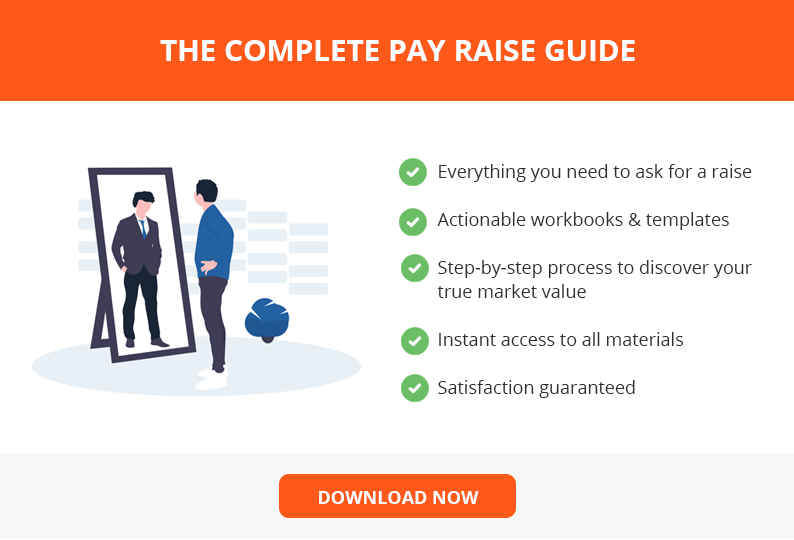We know that it’s an uncomfortable topic no matter your field of work, but we’re here to tell you that it’s okay. If you pay close attention to what we go over you’ll leave with the tools you need to finally ask for that raise.
We’ll be going over a lot of information, which is why we’ll be breaking everything down into easy to read sections.
How Often Should You Ask for a Raise
- Try keeping it to once a year, at most
- Evaluate your own performance first
- Timing is key, both time of year and time of day
- Research how much your role is worth in your area
- Consider going for a promotion
- Have a plan B
That’s a brief recap on everything we’ll be going over today
Now, while you can skip around at your leisure, we definitely recommend that you thoroughly read each and every section.
With all of that being said, let’s dive right into the facts about how often to ask for a raise.
Sit back, relax, and get ready to get empowered.

Try to keep it to about once per year
When it comes down to asking for a raise, we know that you’re very eager to get one, but you need to consider the frequency in which you can ask. Some of the things we disclose in this section may not be true for every job or industry, so please keep that in mind as you read on.
Think about how often your performance is reviewed
Performance reviews are usually the best time to ask for a raise, and the best part about these reviews is that you don’t always need to ask. This is due to the fact that most companies incorporate raises into their business model, and will dish them out based on performance reviews.
Therefore, when it comes to asking for a raise, you’ll want to make sure that you line it up with the frequency in which your performance is reviewed. This is an excellent rule of thumb to follow, and a way to make sure that your boss doesn’t get frustrated with you asking every other month.
How often can I ask for a raise if my company does not offer reviews?
Now, we know that every company is different, which means that your company may not be the type to give you a performance review. Now, if this happens to be the case, you’ll want to make sure that you ask once every year. This will make it seem like you’re not desperate, but it will also make sure that you’re not asking too many times.
When it comes to how often to ask for a raise, you need to make sure that you’re not asking too often. This will end up harming your chances in the long run, and can even lead to other types of implications.
Evaluate your own performance first
When it comes to asking for a raise, or how often to ask for a raise, the first thing you need to do is to evaluate your own performance. This is due to the fact that most companies will not necessarily guarantee you a raise, but can do so if your performance reflects that you deserve one.
This means that you need to make sure that you have a lot going for you in terms of performance. We’re not sure about how your place of work operates, but here are some things to consider before you begin planning out your raise:
- Did you finish a project that had an impact on the company?
- Is the work you’re doing important to the company?
- Have you blown away your quota?
- Did you recently earn an award?
- Has your boss noticed and commented about your hard work?Are you always getting things done before their deadlines?
Please keep in mind that these are only a few things for you to consider, but to be quite honest with you, you should be asking yourself these questions before you plan out a conversation about a raise. If you’re absolutely killing it at work, well then it may be a good time for you to reach out for a raise.
So what we mean in this section is that you need to be able to backup your demand for a raise. If you’ve been lackluster at work, this is the time to step things up and blow your boss away.
Timing is key
When it comes to asking for a raise, you’ll need to make sure that you get the timing down pat. Don’t panic, it’s really nothing crazy, just make sure that you’re not catching the boss on an off day. This is due to the fact that their mood can actually determine how well your raise holds up.
This also depends on the boss, and it’s really more than just his or her mood.
If your boss is very busy trying to finish up a project, goals, or any other type of deadline, you should probably avoid adding more to their plate. This is due to the fact that while they’re under a high amount of stress you might come up last on their list.
Did they forget about your performance review?
Now we know that we just talked a whole lot about the mood of your boss, but there is another piece of the whole timing equation that we need to look at. This is due to the fact that most companies have a performance review at a certain increment -whether that be annual or semiannual usually depends on the company.
If your boss failed to go over your performance with you, or had to get back to you, this is actually a good time to inquire about a raise. You’ll obviously want to walk in there prepared, but if it’s remotely around the time of your review you have a pretty solid chance.
When looking at how often to ask for a raise, you need to consider the timing of the whole situation. Never ask for a raise when your boss is busy or feeling down… because it can have an impact on your success.
Do some research about what your role at the company is worth
Now that we’ve gone over some of the more minor details about when to ask for a raise, it’s time to focus on the keys to success. The first thing you should always do is bring up data about your position at the company. In this case the timing is key as well, because this approach should be taken around the time of your performance review.

What should you bring up?
It’s not really about what to bring up, it’s more about how you bring it up. Sure, you can sit there and argue that people with the same role as you are paid more, but you really need to make an argument out of this. Listen, to be upfront with you, you need to do your best to make it seem like you’re not whining about this.
In order to do so, make sure that you have clear evidence of your role being better compensated elsewhere when you’re ready. Now, aside from just the evidence you bring to the table, make sure that you utilize some good old persuasion here.
Here are some pretty solid tools you can use to make a solid case for your raise:
- Show the value of your work at other companies
- Make sure your boss understands how valuable you are as an individual
- Even if it’s not directly related to your role — reference traits that make you stand out as a person
Please keep in mind that these are only a few things to consider, and you should always be a bit creative about your approach. Now, with that being said, make sure that you really wow your boss with your approach.
It’s not really about how or when you ask for a raise sometimes, and that’s due to the fact that a lot of it really comes down to your tone. So don’t make it seem like you’re complaining, make it seem like you 100% know that your time is worth more. When you present a case like that, well, your boss will have a hard time shooting you down.
Also see: How much of a raise to ask for? and Should I ask for a raise when I get my Masters?
Is there a promotion available?
When considering how often you should ask for a raise, one thing you should definitely keep in mind is the idea of a promotion. This is due to the fact that while a promotion may not be a raise for your current role at the company, a promotion can help you enter a whole new bracket of earning potential.
Make sure you know if one is available
Before you ask your boss for a promotion, or to be considered for one, it’s a good idea to make sure that there is one waiting for you. This is due to the fact that most companies won’t create a position just for you, and if one is not available at the time you ask it can lead to some issues.
Make sure you’re qualified
Not every promotion is going to be in reach, and this really applies to any type of work you may be doing. Therefore, when it comes to asking for a promotion, make sure that you have some performance or credentials behind you to back it up. If you fall short on either side, well, it can lead to you not getting that promotion you were after.
When it comes to how often to ask for a raise, sometimes a raise is not always the best approach. While that may seem odd, depending on your situation it might actually be better to ask for a promotion instead. Plus, with a promotion, your earning potential down the line can also increase.
Not a bad deal, right?
Have a plan B
This is something that will give you both confidence and an escape route. We know that we’ve shown you some pretty good tips so far, but sometimes it’s really out of your control. You may be told no. Or, the raise you receive isn’t enough. This is why we always recommend that you have a plan B.
What does a plan B look like?
A plan B is essentially another company that you’ve been looking at for a little while. If that company has an opening for your role, and seems to pay a bit more, it can be a good idea to keep that company in mind. This is due to the fact that you can use that company as evidence to support your raise demand, and if that fails you can jump ship into a new role.
When should you act on a plan B?
A plan B sounds scary, we know that, but we also don’t want you to panic. We want to make sure that you get the money you deserve, which is why we need to allocate a little bit of time going over how to lineup a proper plan B. We want to start by saying that timing is actually key here, because you don’t want to just immediately quit your job the second you don’t get a raise. Our article on Raise Guide covers this: When you ask for a raise and don’t get it
So when it comes to acting on a plan B, first of all it will give you confidence. That confidence comes from pursuing a few leads, so make sure that you’ve done your homework. Once you know that you’re a good fit for your plan B, or that they’ll be open to having a conversation with you, it’s time to give your company an ultimatum.
Now, obviously don’t come out there and call it an ultimatum, but make it known that you’ll be reviewing other options if they won’t be giving you a raise. This will give them a sense of urgency when reviewing your case for a raise, and can lead to a higher chance of success. Plus, if it turns out that they won’t be giving you a raise, you can head on over to your new home.
Confidence is key when it comes to asking for a raise, and to be blunt, having a backup plan is sometimes the best approach. It will give you confidence, a case to be made for your raise, and an escape route if you find out you won’t be getting one.
Recap: Planning for how often you should ask for a raise
We know that we’ve shown you a lot of information today, and sometimes it can be a lot to take in. When it comes to looking at when to ask for a raise, there is really a lot to consider. Plus, to be blunt, sometimes it’s not really going to be in your favor if the boss is having a hard time on their own.
We’ve definitely shown you what we could, but if you ever feel a bit lost or confused, please feel free to refer back to this article as a guide. We want to make sure that you’re always prepared, so trust us on this one, there is no shame in reading a section over again if you must.
Now that you know the facts, make sure that you approach the situation with confidence. As we’ve mentioned earlier, it’s not always about the timing, because sometimes it comes down to your attitude.
Now that you know everything you need to know about when to ask for a raise, we want to see you succeed.








